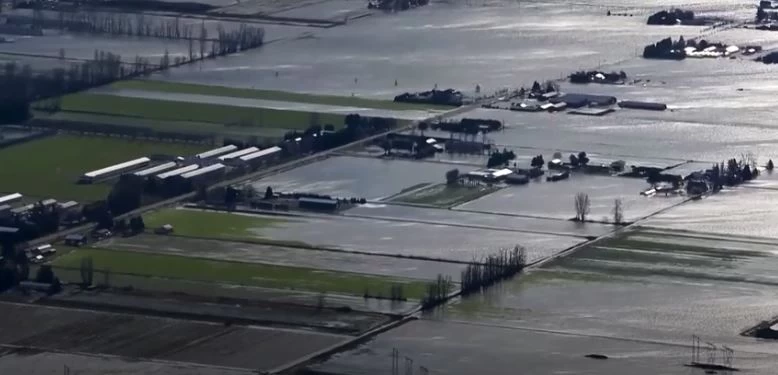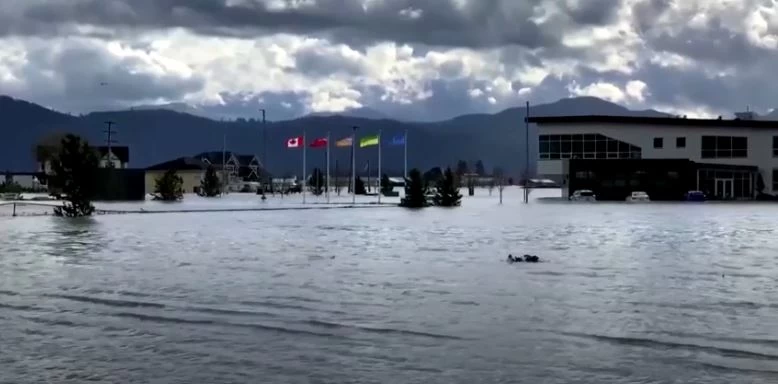Canadian authorities were still trying to reach 18,000 people stranded on Thursday after floods and mudslides destroyed roads, houses and bridges in what could be the costliest natural disaster in the country's history.

Receding flood waters were helping rescue efforts, but the downpour blocked off entire towns in the province of British Columbia and cut access to the country's largest port in Vancouver, disrupting already strained global supply chains.
Premier John Horgan said the death toll would most likely rise from the one confirmed fatality. Many towns are in mountainous areas to the east and northeast of Vancouver with limited access.
Residents in Merritt, which has been cut off for almost four days, told CTV on Thursday that waters were starting to drop and a bridge has reopened.
Late on Wednesday, emergency workers were able to temporarily open a narrow road to Hope, which had also been cut off since Sunday. Once people had left, the road would be closed again, the provincial government said.

At one point the city of Abbotsford, to the east of Vancouver, feared the waters would overwhelm their pumping station and force the evacuation of all 160,000 residents.
Mayor Henry Braun said on Thursday there had been no change in the status of the pumping station and water was receding "at a pretty good clip (rate)" in some parts.
"We continue to move toward the recovery phase of this emergency," he told a briefing, while noting that more heavy rain was forecast for next week.
"We are not out of this by a long shot yet," he said, adding he had been promised help by federal Prime Minister Justin Trudeau and many provincial ministers.
"I take them all at their word. But I've also prepared them for one big bill at the end of this," he said, estimating it would cost up to C$1 billion ($792 million) to repair local damage.
This strongly suggests the final amount will far exceed the C$3.6 billion in insured losses from wildfires that hit Alberta's oil-producing region of Fort McMurray in May 2016.

"Easily the costliest natural disaster in Canadian history. Won't even be close," tweeted University of Calgary economics professor Blake Shaffer, a specialist in climate policy.
The disruption to Vancouver's operations is set to exacerbate existing supply chain issues and could even make Christmas trees harder to find, farmers said. read more
One of those who managed to get out of Hope was Simon Fraser University professor Enda Brophy.
"If there's anything to be learned from this experience, it's we are woefully underprepared for the environmental disasters that are on the way. We can barely cope with the ones that we have," he said by phone.
A massive wildfire in the same region during a heat wave this summer may have left hills devoid of vegetation that contributed to the flooding and mudslides.
The federal government in Ottawa is promising to send hundreds of air force personnel to British Columbia and says thousands more are on standby.
SOURCE: REUTERS

FTC declines to enforce a kids privacy law for data collected to verify users’ ages
- 9 hours ago

The false promise of a “no sugar” diet
- 7 hours ago

Everyone ignores this good news about democracy
- 7 hours ago
Stars' Rantanen out weeks after Olympic injury
- 8 hours ago
Dodgers' Sasaki hit hard, struggles in spring debut
- 8 hours ago

Cricut’s most popular cutting machine now takes up less space in your crafting room
- 9 hours ago

Netflix’s F1 series Drive to Survive will stream on Apple TV, too
- 9 hours ago
Lightning's Cooper out 2 games after dad's death
- 8 hours ago

The Pentagon’s battle with Anthropic is really a war over who controls AI
- 7 hours ago

Can you fix a broken democracy without breaking it more?
- 7 hours ago

The most important line from Trump’s State of the Union
- 7 hours ago

Brazil vs. US: Two insurrections, different results
- 7 hours ago





.jpg&w=3840&q=75)




